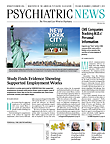Residents rated direct clinical supervision as the most favorable way for faculty supervisors to assess trainee skills in the “core competency” of professionalism and ethics.
That was the finding of a survey of trainees published in Academic Psychiatry (November-December 2013) by Laura Weiss Roberts, M.D., chair and the Katharine Dexter McCormick and Stanley McCormick Memorial Professor in the Department of Psychiatry and Behavioral Sciences at the Stanford University School of Medicine
The mean rates of approval for six common methods of trainee assessment were highest for direct clinical supervision—when faculty supervisors are watching residents in actual clinical interactions with patients. The other five methods, in order of mean approval by residents, are oral examinations, short-answer questions, essays, standardized patient interactions, and multiple choice questions.
The Accreditation Council for Graduate Medical Education (ACGME) has mandated that training programs require their residents to attain competency in six core areas: patient care, practice-based learning and improvement, medical knowledge, interpersonal and communication skills, systems-based practice, and professionalism.
Professionalism is defined as demonstrating a commitment to carrying out professional responsibilities, adherence to ethical principles, and sensitivity to a diverse patient population.
“Using direct faculty supervision in assessing professionalism has many practical advantages,” Roberts and colleagues said. “First, direct faculty supervision is generally straightforward to implement and fits with the ecology of usual teaching in clinical settings, which is probably why clinical supervision is the most common assessment method used among medical schools and residency programs. Second, it offers the opportunity to evaluate trainees in real-life situations. Third, direct faculty supervision allows for immediate feedback to students, which is particularly helpful when the purpose of the assessment is to promote the learning process tailored to individual students’ needs.”
They added that previous empirical work has shown that when faculty members supervise students, they exhibit increased awareness of their own professional behavior; a “positive feedback loop may therefore result, as supervisors, in turn, become better role models for trainees,” they said.
All psychiatry residents in postgraduate years 1-6 at seven training programs were asked to respond to the survey. The seven programs were Mayo Clinic College of Medicine, Medical College of Wisconsin, University of Arkansas for Medical Sciences, University of California San Diego School of Medicine, University of Chicago Pritzker School of Medicine, University of Massachusetts Medical School, and Walter Reed Army Medical Center.
The survey instrument was organized into 10 domains on the basis of the American Board of Internal Medicine’s definition of professionalism: attitudes, goals, learning methods, curricula, knowledge-assessment, skills-assessment, and educational needs concerning informed-consent topics, principles, vulnerable populations, and relationship boundaries. Each item was rated on nine-point scales.
Roberts and colleagues added 28 questions relevant to psychiatry residency training, resulting in a total of 149 questions in the 10 content domains.
Psychiatry residents were asked to rate methods for assessing skills related to professional attitudes, values, and ethics on a scale of 1 (strongly disagree that the method is appropriate) to 9 (strongly agree).
A total of 151 residents (61 percent) responded, and they included psychiatry residents at all training levels.
Respondents agreed that direct faculty observations of residents’ interactions with patients and clinical team members are appropriate for assessing skills with a mean overall rating of 7.59. Other surveyed methods and their mean ratings were as follows: oral examinations, 5.49; short-answer questions, 5.08; essays, 5.07; standardized-patient interactions, 4.96; and multiple-choice examinations, 4.03.
“In clinical care and clinical education, professionalism is demonstrated through respectful conduct, compassion, acquisition, and retention of expertise and technical skill—in other words, behaviors that reflect adherence to the ethical standards of the field,” Roberts told Psychiatric News. “Supervisors observing trainees will look for evidence of respectful listening and thoroughness in data-gathering, signs that the privacy and dignity of the patient are being honored, and appropriate use of expertise and skill to help patients.
“Supervisors will also consider how trainees handle very difficult situations—for example, when a resident encounters a situation in which he or she has little experience or insufficient expertise. The supervisor will look for the resident to seek out supervision, to be especially diligent in obtaining new and clarifying relevant information, and to be especially careful in safeguarding the patient.”
She added, “Our early career colleagues prefer to learn about professionalism and ethics in the ecology of their everyday work. When thinking about how best to approach a conversation with a young mother about her child’s newly diagnosed mental health issue and to address her concerns with gentle honesty, sincerity, and sensitivity, for example, the philosophical notion of beneficence and the legal concept of informed consent seem very far removed. Working with a supervisor who is attuned to the importance of these experiences and the maturing clinical identity of the early career psychiatrist appears to be especially valued.” ■
